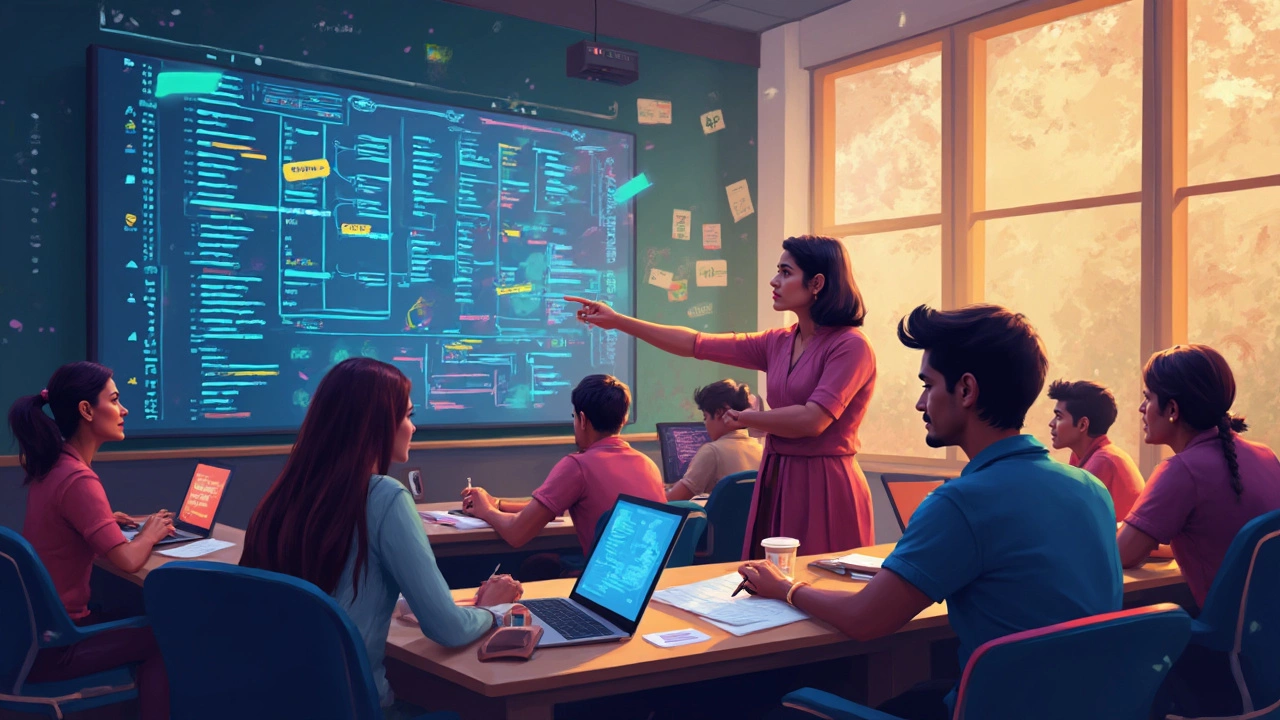Coding Tag – Your Quick Guide to Learning Programming for Free
If you landed here, you’re probably wondering how to start coding without spending a ton of money. Good news – there are plenty of free courses, step‑by‑step roadmaps, and real‑world advice right at your fingertips. This page pulls together the most useful ideas from our coding articles so you can jump straight into practice.
Start with a Simple Roadmap
First, pick a language that matches your goal. For web basics, HTML, CSS, and JavaScript are the go‑to trio. If you’re eyeing data jobs, Python is a solid choice. Mobile apps? Try Kotlin or Swift. Once you know the language, break your learning into four weekly blocks:
- Week 1: Learn syntax basics – variables, loops, conditionals.
- Week 2: Build tiny projects like a calculator or a to‑do list.
- Week 3: Dive into a simple framework or library (React for JS, Flask for Python).
- Week 4: Polish a small portfolio project and share it on GitHub.
This structure keeps you moving forward without feeling overwhelmed.
Best Free Resources You Can Trust
Not all free sites are equal. Here are three platforms that consistently deliver quality content:
- freeCodeCamp: Interactive lessons, real‑world projects, and a vibrant community.
- Coursera (audit mode): Access university‑level courses from MIT, Stanford, and others – you only pay if you want a certificate.
- GitHub Learning Lab: Hands‑on tutorials that teach you how to use Git while you code.
Combine these with YouTube channels like "Traversy Media" or "Programming with Mosh" for visual explanations that stick.
Now, let’s talk about why so many beginners quit.
Common Reasons People Give Up (And How to Beat Them)
Unrealistic expectations. Seeing a senior developer’s résumé can make you think you should be an expert in weeks. Counter this by setting tiny, measurable goals – like solving one coding challenge a day.
Lack of practice. Watching videos without typing code is like reading a recipe without cooking. Use platforms like LeetCode or HackerRank for daily practice.
Getting stuck on errors. Everyone hits "syntax error" roadblocks. Instead of searching endless forums, learn to read error messages; they usually tell you exactly what’s wrong.
No community. Coding alone can feel isolating. Join Discord servers, Reddit’s r/learnprogramming, or local meetups to share progress and get help.
Finally, remember that learning to code is a marathon, not a sprint. Celebrate small wins – a working button, a bug‑free function, a starred repo. Those moments build confidence and keep you moving forward.
Browse the posts under this tag for deeper dives: a detailed free‑course list, a timeline for mastering programming, and a guide on how to stay motivated when the code won’t compile. Use the roadmap, pick a resource, and start building today.
Is Coding Hard to Learn? A Real Look at How Anyone Can Start Coding Today
Wondering if coding is hard to learn? Discover the realities, biggest myths, and how any beginner can start and succeed with coding today.
Coding or Math: Which Is Tougher to Master?
This article dives into the age-old debate: what's harder, coding or math? It explores the real challenges behind each skill and who finds them difficult. The piece breaks down the nature of both subjects, their overlap, and what they demand from you. You'll get facts, practical tips, and some unexpected truths that can help you decide which path is right for you. Whether you're eyeing a coding bootcamp or sweating over math homework, this guide brings clarity.
Can You Learn Coding If You're Bad at Math?
Wondering if your lack of math skills might hold you back from learning to code? Dive into this article to uncover the truth about coding and math. Spoiler: being bad at math doesn't mean you can't become a proficient coder. While math can definitely help, coding is more about logic and creativity. We explore practical tips for those hesitant about math but passionate about coding.
Programming vs. Coding: What's the Difference?
Understanding the difference between programming and coding is essential for anyone entering the tech world. While coding involves writing the specific instructions computers need to perform tasks, programming encompasses the entire process of creating software, including planning, designing, testing, and more. Distinguishing these terms helps beginners choose learning paths that align with their goals. Here's a closer look at what sets them apart and how each plays a role in the tech landscape today.
Understanding the Key Differences Between Coding and Programming
Coding and programming are terms often used interchangeably in the tech world, but they are not the same. Coding is the process of writing lines of code, while programming involves designing the whole program, problem-solving, and creating algorithms. Understanding the distinction is vital for anyone stepping into the world of technology. This article explores these differences, offering insights and practical tips for beginners to understand their roles in software development.
Mastering Coding with Just 1 Hour a Day: Is It Possible?
Diving into the world of coding doesn't necessarily mean you have to invest countless hours each day. With focused and effective methods, dedicating just 1 hour a day can be sufficient to develop a strong foundation in coding. This article explores different strategies, effective learning techniques, and the pros and cons of such an approach, aiming to help newcomers strategically plan their coding journey.





